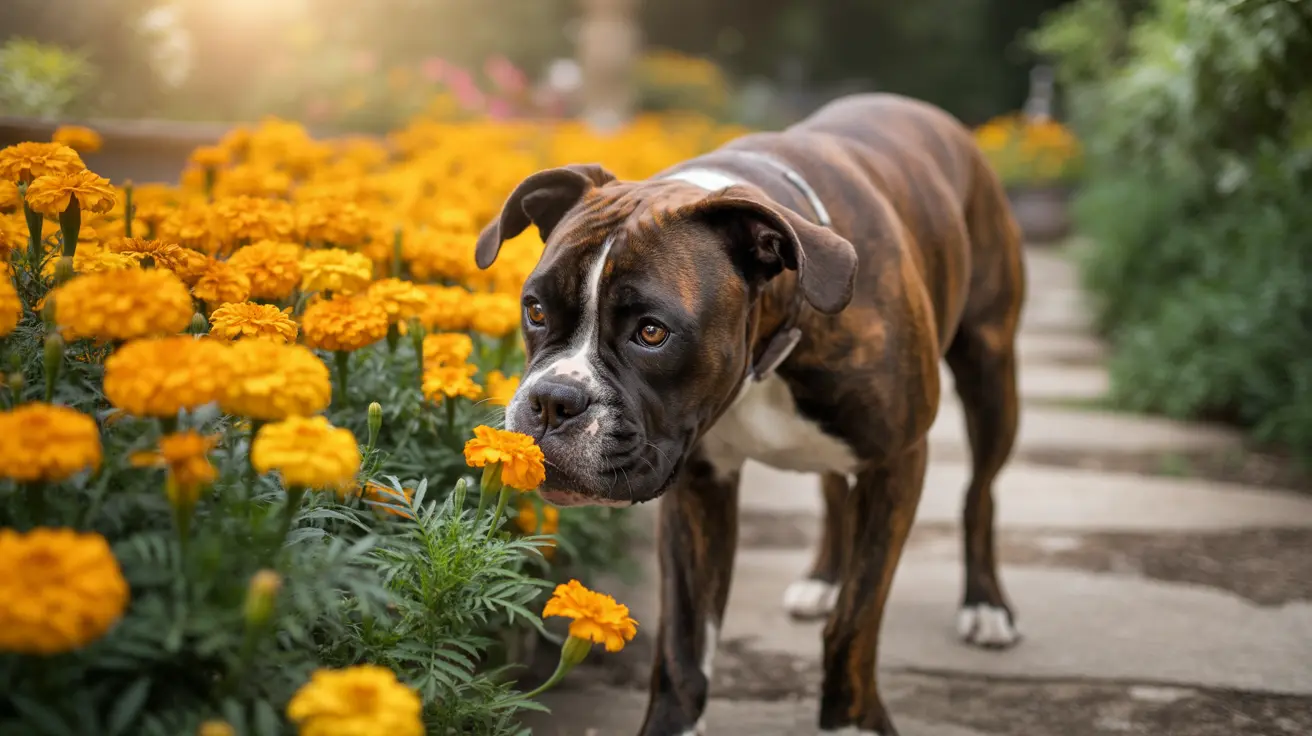If you're a dog owner who loves gardening, you've likely wondered about the safety of various plants around your furry friend. Marigolds, with their vibrant orange and yellow blooms, are popular garden flowers that often raise concerns among pet parents. But just how dangerous are these cheerful flowers to our canine companions?
The good news is that while marigolds can cause mild discomfort if ingested or touched, they're generally considered only mildly toxic to dogs. However, understanding the specific risks and symptoms can help you make informed decisions about including these flowers in your garden landscape.
Understanding Different Types of Marigolds and Their Effects
Not all marigolds are created equal when it comes to potential toxicity. The two main types you'll encounter are:
Tagetes Species (African and French Marigolds)
These common garden varieties contain compounds that may cause mild gastrointestinal upset and skin irritation in dogs. The sap can be particularly irritating to sensitive areas like eyes and nose.
Calendula Officinalis (Pot Marigold)
This variety is generally considered non-toxic and is even used in some pet care products. However, consuming large quantities can still lead to stomach upset in sensitive dogs.
Signs Your Dog Has Been Affected by Marigolds
If your dog has encountered marigolds, watch for these common symptoms:
- Mild vomiting or diarrhea
- Excessive drooling
- Skin redness or irritation
- Eye irritation
- Pawing at the mouth or face
- Mild lethargy
What to Do If Your Dog Eats Marigolds
Most cases of marigold exposure can be managed at home, but it's important to know when to seek help:
Immediate Steps
- Remove any remaining plant material
- Monitor your dog closely
- Rinse affected areas with clean water
- Contact your veterinarian if symptoms are severe or persistent
When to Seek Veterinary Care
Call your vet immediately if you notice:
- Severe or prolonged vomiting
- Significant lethargy
- Difficulty breathing
- Severe skin reactions
- Signs of dehydration
Prevention Tips for Dog Owners
The best approach is to prevent exposure in the first place:
- Create physical barriers around marigold beds
- Train your dog to avoid garden areas
- Consider planting marigolds in raised beds or hanging baskets
- Supervise outdoor time, especially with curious puppies
- Choose pet-safe alternatives for garden areas accessible to your dog
Frequently Asked Questions
Are marigolds poisonous to dogs, and which types pose the most risk?
Marigolds are considered mildly toxic to dogs, with Tagetes species (African and French marigolds) posing more risk than Calendula officinalis (pot marigold). While rarely causing serious illness, they can cause temporary discomfort if ingested or touched.
What symptoms should I watch for if my dog eats or touches marigolds?
Watch for gastrointestinal symptoms like vomiting and diarrhea, skin irritation, excessive drooling, and eye irritation. Most symptoms are mild and resolve on their own within 24 hours.
What should I do if my dog eats marigolds or shows signs of irritation?
Monitor your dog closely and contact your veterinarian if symptoms are severe or persistent. Remove any remaining plant material and rinse affected areas with clean water. Most cases can be managed at home unless complications develop.
How can I prevent my dog from getting exposed to marigolds in the garden?
Create physical barriers around marigold beds, supervise outdoor time, and train your dog to avoid garden areas. Consider planting marigolds in raised beds or areas inaccessible to your pet.
Are Calendula marigolds safe for dogs compared to African or French marigolds?
Yes, Calendula marigolds (pot marigolds) are generally safer for dogs than African or French marigolds. They're considered non-toxic and are even used in some pet care products, though large quantities can still cause mild stomach upset.
While marigolds aren't severely toxic to dogs, it's always better to err on the side of caution and prevent access to these plants. If you're concerned about your garden's safety, consult with your veterinarian about pet-friendly landscaping options that work best for your specific situation.






